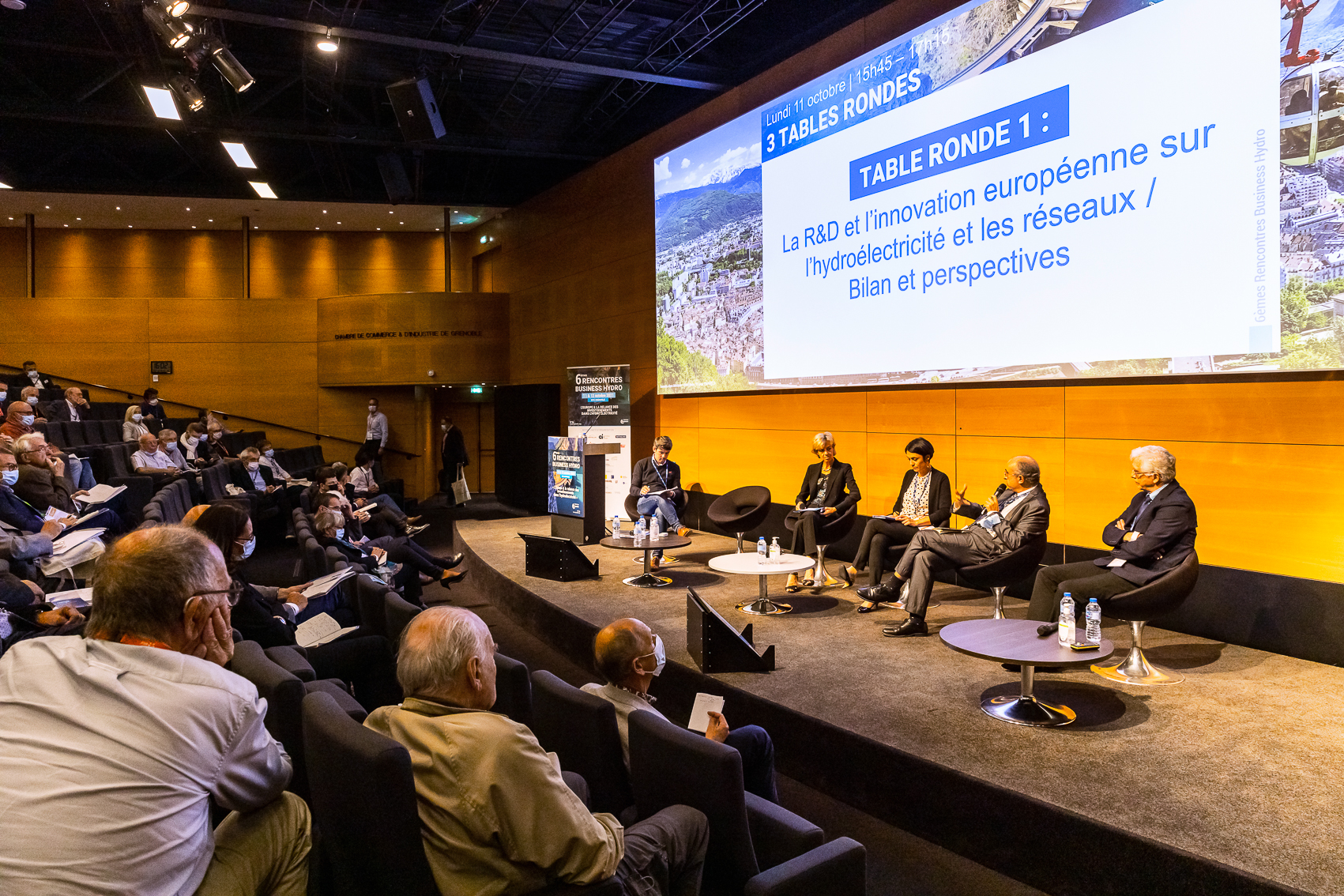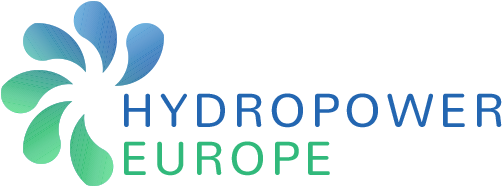Latest News
Participation at Hydro21 in Grenoble
HYDRO 21 is an event that gathered about a thousand participants over two days in Grenoble in person and by videoconference. Two of our colleagues, Dr. Anton Schleiss and Dr Jean-Jacques Fry were invited to participate in order to share their expertise about the hydropower sector in Europe.
Jean-Jacques Fry participated in the first round table dedicated to "The place of hydropower in the European electricity sector". Christophe Leininger, General Delegate of UFE (French Union for Electricity) introduced the debate. He recalled that the European Commission listens to the federations because it does not have the time to meet with each one of the actors. Which means, the action carried out with Eurelectric on the taxonomy made it possible to authorise small run-of-river power stations to be supported by sustainable finance and to avoid that PSH power stations not appear as a means of electricity production. The very strict environmental protection criteria have been reduced from those of the Water Framework Directive.
He points out three major problems:
- the Competition Directorate promotes technically neutral tenders for concessions (without mentioning the technology). This approach is currently distorted by the fact that the cost of solar and wind externalities (flexibility and storage) is forgotten.
- Lack of long-term vision. The European institutions only support short-term structures and investments.
- The location criterion (everything comes from Europe) does not work, even though it is the basis for the development of our competitors' markets (China, USA).
Dominique Grand recalled that the method of F. Wagner, President of the European Commission of Physics, applied to Germany and France for 2050, shows that one quarter of solar and wind production must be stored at a rate of one to two times a day. This results in such a quantity that the solution does not currently exist.
Prof. Nouredine Hadjsaid insisted on the fact that stability and safety are the priority, as evidence, he quoted the study of the network in France which evaluates the impact of a 1 day black out at 1% of GDP.
Jean-Jacques Fry remarked that the European Commission has given several positive signals towards hydropower:
- In 2018, date of its commitment to the energy transition, it launched the call for tenders to create an hydropower forum, which would result in the obtention of a RIA and SIR by 2021.
- The H2020 framework programme provided 4 times more money to hydropower R&I than FP7.
- In 2022, it is requesting an Hydropower ETIP to be created
He pointed out that the R&I programme is ready to be submitted to the EC, after consultation with almost 600 people. It includes, not only efforts to increase flexibility and storage, but also research programmes on the cost of flexibility and on societal and environmental aspects such as improving the environmental footprint.
The conclusions of these debates have clarified the strategic actions, to which the HYDROPOWER EUROPE Forum and the future ETIP Hydro have contributed and will contribute.
- Flexibility is a key issue (30 GW to 60 GW in France depending on the scenario). The valorisation of this flexibility by system services is a market design to be investigated
- There is a difficulty in obtaining European funds. Provisions to support companies are essential.
- Other sources of funding need to be developed. The needs, tools, price signals and funding (active structures and professionals) must be determined.
Secondly, Anton Schleiss was invited to participate to a panel discussion on the topic of the "restart of investments in hydro in Europe" on the second day of the conference.
He highlighted that the electricity spot market conditions at the moment are very favorable and it seems that this situation may continue in future especially when the massive subsidize in the other renewables like solar and wind will be considerable diminished towards free market conditions. By eliminating the distortion of the market hydro will have a bright future and will be an important and highly needed catalyst for the energy transition.
At the example of Switzerland he stressed that future development will be towards flexibilization of hydro including the increase of winter generation mainly through the extension of reservoir storage by, not only heightening existing dams, but also building new multipurpose dams at new lakes which will or already have formed in valleys freed by glacier retreat.
Besides the already ongoing development of pumped-storage, another focus will be the increase of the installed capacity in existing power houses by adding new parallel underground waterway systems, which allow to concentrate the generation on a few hours per day or on short periods when the market prices are highest.
He also said that a consensus with environmental requirements can be found by innovative mitigation solutions which may even improve biodiversity compared to the actual situation at existing and future hydropower schemes.

Latest News
EVENT: Developments and biodiversity of watercourses. 8-10 November 2022
"Aménagements et biodiversité des cours d’eau" (EN: "Developments and Biodiversity of watercourses") is a conference organised by the Societé Hydrotechnique de France (SHF), next 8-10 November 2022 in Strasbourg, France. About the confere...
CONFERENCE: "QUO VADIS? Innovation potential of Hydropower" 27 - 28 October 2022
"QUO VADIS? Innovationspotential der Wasserkraft" (Innovation potential of Hydropower) is a conference organised by IBI- Kompetenz, the multidisciplinary platform for e...
JOINT LETTER: Renewables displace fossil fuels - the Innovation Fund must recorgnise this
Joint letter signed by: Bioenergy Europe, the European Heat Pump Assocition (EHPA), the European Renewable Energies Federation (EREF), the European Solar manufacturing Council (ESMC), the European Solar Thermal Electricity Association (ESTELA), Solar Heat Europe (ESTIF), Solar Power Europe, the A...
ETIP HYDROPOWER EUROPE: The permanent and common voice of Hydropower in Europe
ETIP Hydropower Europe (ETIP Hydropower) is a new project in the EU programme ...
Prof. Anton Schleiss at the 7th IAHR Europe Congress (Greece)
Prof. Anton Schleiss, from the International Commission on Large Dams (ICOLD - CIGB), was invited as a keynote speaker for the opening session og the ...
Hydro Power Industry Guide 2021/22 by VGBE
After the success from "Hydro Power Industry guide 2020/21", our colleagues from VGBe wanted to offer us the new guide from this year: “Hydropower Industry Guide 2021/22”. vgbe´s ...
POSITION PAPER: Hydropower as a catalyst and facilitator for the clean, safe and independent energy transition in Europe.
Key Messages: Given Europe’s ambition to raise the renewables target to 45%1 hydropower is critical to ensure Europe’s energy system has the necessary renewable electricity and flexibility to protect grid stability from intermittent renewable energy, to sustain the gr...
NEW PUBLICATION, Hydroscience Journal: "Hydropower, a catalyst for energy transition in Europe"
On the context of HydroES 2021 (22 September 2021), Hydropower Europe had the chance to present its vision and results achieved during three years of consultations. Some of the conclusions are: Hydropower still has a great potential for development Hydropower sector needs...
HYDRO 2022 Strasbourg: How to promote future hydro development in Europe with a sustainable impact?
The HYDROPOWER EUROPE project (2018-2022), funded from the European Union's Horizon 2020 research and innovation program, has released its final deliverables: a Research and Innovation Agenda (RIA) and a Strategic Industry Roadmap (SIR) for the hydropower sector. The challenge is...
Webinar 28 february 2022: What Research and Innovation are Needed to Tap More Hidden Hydro Opportunities in the Future?
The IEA Technology Cooperation Programme (TCP) on Hydropower (also known as IEA Hydro) is a working group of the International Energy Agency's member countries and others that have a common interest in advancing hydropower worldwide. Under the work programme Annex XVI...




